Past Events

- Dr. Lakshmi Ramgopal, Assistant Professor of History, Columbia University
- 4130 Posvar Hall Global Studies
Join us as we welcome Dr. Lakshmi Ramgopal, a Roman historian and Assistant Professor of History at Columbia University as part of our Classic and the Global Lecture Series. Dr. Ramgopal will explore how Romans and non-Romans living along the western coast of the Black Sea adapted to the changing mechanics of imperial administration and Roman citizenship in the second and third centuries CE using epigraphic evidence for intermarriage and worship of the emperor from this region. The presentation's material comes from her in-progress book, Romans Abroad: Associations of Roman Citizens, which studies the logic of interaction between Romans and non-Romans in non-Roman communities around the empire.

- Michael Goodhart, Political Science; Director of Global Studies Center
- Global Hub Global Studies, history
In 1619, a ship carrying 20-some enslaved Africans arrived in British North America. In commemoration of the 400th anniversary of that history-shaping event, the Department of Africana Studies and the Global Studies Center will host Conversations on 1619. Too many Americans are ignorant or ill-informed about the history of slavery and enslavement, and there are too few opportunities to have frank conversations about it. Events, aimed at Pitt undergrads but open to all members of the Pitt community, provide a space for informed, moderated discussion of topics related to slavery, whiteness, racism, and the making of our country.

- Maria Todorova, University of Illinois
- 4130 Posvar Hall
As part of our Year of Memory and Politics and 1989 Series, the ESC, in cooperation with REEES, is pleased to welcome Maria Todorova as a Jean Monnet Center of Excellence speaker. Based on her forthcoming book on the perceived “golden age” of the socialist idea, Dr. Todorova will present the results of her research into a rich prosopographical database of circa 3500 biographies of people born in the 19th century. Based upon the diaries, letters, biographies, and autobiographies of several generations of leftists, she investigates the intersection between subjectivity and memory during the period of the Second International and reconstructs the“structures of feeling” that inspired these individuals. Lunch will be provided!
*This event counts for the UCIS1-credit pop-up course

- Global Studies Center
- Latin American Lecture Room, Hillman Library
In conjunction with the Pittsburgh Arts & Lectures program's "Ten Evenings" series, Global Studies Center is hosting "Four Evenings" pre-lecture discussions that put prominent world authors and their work in global perspective. Open to series subscribers and the Pitt Community, these evening discussions, conducted by Pitt experts, provide additional insight on prominent writers and engaging issues. A limited number of tickets to the author's lectures will be available to those who attend the discussions.
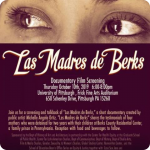
- Michelle Angela Ortiz
- Frick Fine Arts Auditorium
Join us for a screening and talkback of "Las Madres de Berks," a short documentary created by public artist Michelle Angela Ortiz. "Las Madres de Berks" shares the testimonials of four mothers who were detained for two years with their children at Berks County Residential Center, a family prison in Pennsylvania. Reception with food and beverages to follow.
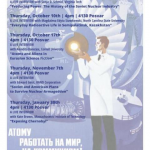
- Magdalena Edyta Stawkowski, Department of Sociology & Anthropology, North Carolina State University
- 4130 Wesley W. Posvar Hall
From 1949 to 1989, the Soviet Union conducted 456 nuclear tests at Semipalatinsk nuclear test site in Kazakhstan. Despite decades of nuclear fallout, Kazakh rural communities inhabit the area around the site. How has living around a nuclear test site shaped those communities and their post-Soviet experience? This live interview with Magdalena Stawkowski will discuss her ethnographic work and the ways the Semipalatinsk test site still shapes economy, environment and subjectivities.

- 211 David Lawrence
In cooperation with the Department of German’s German Campus Weeks programming, and as a part of the University Center for International Studies Global 1989 Series, this month’s Conversation will discuss the legacies of the two Germanies that existed between 1949 and 1990. Thirty years after the fall of the Iron Curtain, do differences between east and west still persist in Germany?
To participate remotely, contact irm24@pitt.edu.

- Dr. K. Frances Lieder
- 4130 Posvar Hall
This reading group for educators explores literary texts from a global perspective. Content specialists present the work and its context, and together we brainstorm innovative pedagogical practices for incorporating the text and its themes into the curriculum. Books, Act 48 credit, dinner, and parking are provided. Registration link: https://tinyurl.com/y6rh9q2e

- Alumni Hall, Room 323
Join us for a screening (with English subtitles)and discussion led by film expert Stephen Brockmann (Carnegie Mellon University). Goodbye, Lenin! (2003) was directed by Wolfgang Becker. In this comedy/drama, a dedicated young man, Alex (Daniel Brühl), recreates East Germany in their 77m2 apartment to protect his socialist mother Christiane (Katrin Sass) from the shock of the fall of the Berlin Wall! Can he pull off this elaborate scheme knowing that the slightest shock could prove fatal? Alex strives to keep the fall of the GDR a secret for as long as possible.
*This event counts for the UCIS1-credit pop-up course!
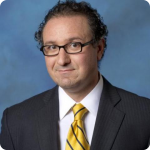
- Dr. Jacques Bromberg, Assistant Professor of Classics
- 4130 Posvar Hall Classics, Global Studies, global issues
This lecture is the first in a yearlong series that puts Classics and Global Studies into dialogue. It seeks to introduce the main themes and subjects of the series by outlining the counters of a new hybrid subfield, “Global Classics”. The aim of educating global citizens capable of tackling global issues is a common theme among twenty-first century universities. But what role can Classics play in this mission? What does it mean to study the ancient world “globally”, and how can the study of antiquity contribute to understanding — and perhaps even addressing — global issues? In this lecture, Dr. Bromberg argues that defining what “Classics” means in the age of globalization is not only an academic exercise, but a strategic undertaking. He examines and challenge prevailing methods for the global study of Classics and attempt to define those that are on the horizon. At the same time, he investigates the ethics and politics of applying Greek and Roman texts and ideas to contemporary global issues.

- Pitt Graduate School Admissions Experts
- Posvar Hall Rm 4130
Considering graduate school? Preparing your application materials?
Join us as Pitt graduate program experts from the School of Public Health, GSPIA, Economics, History, and Asian Studies share expertise on crafting strong applications. Learn tips on writing effective personal statements, securing letter writers, and submitting desired credentials. Ask individual questions to admissions professionals at the breakout session.
Dr. Kevin Broom, Director of MHA and MHA/MBA Programs, Vice Chair, Associate Professor, Pitt Public Health
Dr. Emily Rook-Koepsel, Asst. Director for Academic Affairs, UCIS Asian Studies Center
Dr.Michel Gobat , Director of Graduate Studies, Associate Professor of History
Dr. Daniele Coen-Pirani, Director of Graduate Studies, Professor of Economics
TBA Admissions Professional, GSPIA
Don’t miss out on an opportunity to hear from the experts. Click the link below to secure a spot today!
https://signup.com/go/iWjtzbK

- 4130 Wesley W. Posvar Hall
Join us as we discuss the work that the Pan American Health Organization-World Health Organization (PAHO-WHO) is currently undertaking in Cuba. Topics covered include: the multi-faceted public health challenges the island faces, the organization’s principles of cooperation, and how Pittsburgh-based international partnerships have positively affected the Cuban health system's resilience-building and sustainability measures.
Dr. Duniesky Cintra Cala, who has worked extensively in Cuba’s health system, specializing in Comprehensive and Integrated General Medicine, and Justo Manuel Cardenas Rodriguez, a PAHO-WHO administrator with over 25 years of experience in the field of public health, are the event's invited speakers.
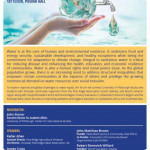
- Global Hub, Wesley W. Posvar Hall Global Studies, human rights, Human Security, water, social justice
The Center for Russian, East European, and Eurasian Studies (REEES) and the Study Abroad Office (SAO) in collaboration with the Pittsburgh-based global service-learning organization Amizade propose to bring together community organizers and nonprofit leaders with University of Pittsburgh faculty and students for a public forum themed “Water Is Life." The thematic concentration on water reflects the contemporary significance of the topic, which invites inquiry from a regional and global perspective. Water is at the core of human and environmental existence. It underpins food and energy security, sustainable development, and healthy ecosystems while being the cornerstone for adaptation to climate change. Integral to sanitation, water is critical for reducing disease and enhancing the health, education, and economic resilience of communities. Water is also a human rights and social justice issue. As the global population grows, there is an increasing need to address structural inequalities that empower certain communities at the expense of others and privilege the growing commercial demand on water resources over social inclusion.
To explore regional and global challenges to water equity, the forum will connect University of Pittsburgh faculty and students with Amizade community organizers from Pittsburgh’s Hill District, the Pine Ridge Reservation (South Dakota), and Brazil’s Amazon region along with nonprofit leaders at the World Aral Region Charity that works in Uzbekistan’s Khorezm Region and the EcoSoap Bank, which focuses on improving sanitation and hygiene education in Subsaharan Africa and Southeast Asia. The forum will commence with initial introductions and will be followed by an open discussion structured with the help of pre-circulated questions, concluding with a Q&A with the audience.
John Stoner (Moderator) is the Executive Director for Academic Affairs at the University of Pittsburgh’s Center for International Studies. Previously, he has served as the Director for Undergraduate Studies and Senior Lecturer at the Department of History teaching and researching in his fields of expertise, notably modern South Africa, twentieth century U.S. labor and foreign relations, and transnational history of the Cold War.
Keller Allen is the Assistant Director of the Pine Ridge Agricultural Initiative and is Amizade’s Site Director for the Pine Ridge Indian Reservation. Keller is a father, husband, craftsman, massage therapist, yoga instructor, educator, community organizer and indigenous rights advocate with experience founding and managing cooperative businesses. Keller holds a Bachelor of Science in Physics, Astronomy and Mathematics from the College of Charleston and a master’s degree in Clinical Mental Health Counseling and Dance/Movement Therapy from Antioch University New England. Keller and his family have lived and worked among their adopted Lakota family on the Pine Ridge Indian Reservation since 2012.
James Cross is Council Representative to the Oglala Sioux Government at the Pine Ridge Reservation in South Dakota.
John Matthias Brown has been working in community development for the past 35 years. He is the founder of the 25-year old Petersfield Sports & Community Club (PSCC) which he served as President for the first 2 years. Three years later, he co-founded the old Association of Community Based Organizations Ltd (AOCBO), formerly Association of Clubs (AOC), which is the umbrella organization for seven community-based organizations in the parish of Westmoreland, Jamaica. Through Mr. Brown’s commitment, influence and guidance, the AOC won the 2007 and 2012 Michael Manley Award for Community Self Reliance which is one of the most prestigious awards in Jamaica. Mr. Brown also serves in his parish as a Justice of the Peace. He sits as Chairperson, Vice Chairperson and as Community Representative on numerous school boards and organization committees. He takes pleasure in counseling young people to help them boost their self-esteem and ways to work harder towards achieving their goals. As Amizade’s Site Director in Brazil since 2004, he has taken pleasure in guiding young people and has overseen service-learning placements in clean water initiatives, community building projects and youth education programs in Santarém city at the confluence of the Tapajós and Amazon Rivers.
Robert Denovich Willard currently pursues his Bachelor of Arts degree in Slavic Studies and Economics Columbia University. He also serves the President of the World Aral Region Charity, a non-for-profit organization working with communities in Central Asia against the devastating disappearance of the Aral Sea—the fourth largest land-bound body of water in the world, now 10% of its original size. With branches at Columbia University, the University of Pennsylvania alongside those in Albany and Uzbekistan, the World Aral Region Charity aims to represent a new outlet for aid in a region often overlooked by the global community. In partnership with local towns and programs in the Khorezm region of Uzbekistan, the Charity works to address challenges to food security, public health, and economic and environmental sustainability.
Samir Lakhani is a social entrepreneur dedicated to restoring health and dignity to developing countries. Before founding Eco-Soap Bank in 2014, Samir was deeply involved in aquaculture and nutrition projects in northern Cambodian villages. He has also developed solar lighting solution projects in Cambodia, Bangladesh, and Nepal. Through his six years of nonprofit work in the areas of nutrition, water accessibility, and sanitation/hygiene, he has witnessed firsthand how delivering key products like soap transform the health and well-being of impoverished communities. Samir received a CNN Heroes Award for Eco-Soap Bank in 2017 and a Unilever Young Entrepreneurs award in 2018. He also recently gave a TEDx Talk. He is a graduate of the University of Pittsburgh and currently lives in Pittsburgh, PA.
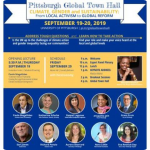
- various
- Alumni Hall, University of Pittsburgh global governance, Climate Change, Sustainable Development, Gender Equality
The European Studies Center, the Global Studies Center, and the University Center for International Studies, with the support of the Office of the Provost and the Year of Pitt Global Initiative at the University of Pittsburgh, in partnership with Global Voice and the Workable World Trust, will host the Second Annual Global Town Hall Meeting on UN and Global Governance Reform on Thursday 19 September to Friday 20 September 2019.
The theme for the discussion will be “Climate, Gender, and Sustainable Development: Local to Global”.
In this two-day event, discussions will focus on the need to think synthetically about climate change, gender equity, and sustainable development in reimagining an agenda for global governance reform and reconfiguring citizen activism for social justice.
Schedule:
Thursday, 19 September 2019: Opening Lecture for Global Town Hall - Humanities Center, Cathedral of Learning
5:30 pm –Paulo Magalhães, “Common Home of Humanity: Creating the Legal Environment to Meet Climate and Nature Emergencies”
Friday, 20 September 2019 – Connelly Ballroom, Alumni Hall (The Livestream will begin promptly at 9 a.m.)
8:30 am - check-in - vegan muffins and coffee
9:00am – Welcome
9:30am – Overview: The Road to 2020 – Earl James, Global Voice
10:00am – Expert Panel Plenary: Gender, Climate Change, and Sustainable Development (moderated by Ariel Armony, Vice Provost for Global Affairs, Pitt) - Livestreamed
· Paulo Magalhães, Common Home of Humanity
· anupama jain, City of Pittsburgh Gender Equity Commission
· Katharina Schulze, Green Party Member, State Parliament, Bavaria, Germany
· Raquel Lagunas, Gender Mainstreaming Advisor in the Gender Team in the Bureau for Policy and Programme Support, United Nations Development Program
12:00pm – Lunch (free to the first 100 people to register)
1:00 pm - Keynote Address : Wanjira Mathai, wPower and Green Belt Movement (Livestreamed)
2:00pm – Breakout Sessions
· Economics of Sustainability with Paulo Magalhães, Aurora Sharrard (Director of Sustainability, University of Pittsburgh), moderator: Michaël Aklin
· Security with Richard Ponzio (Stimson Center), Grant Ervin (Chief Resilience Officer, City of Pittsburgh), moderator: Burcu Savun
· Gender and Development with Raquel Lagunas and anupama jain; moderator: Muge Finkel
· Climate Action and Social Justice with Nora Löhle (Program Director, Energy and Environment, Heinrich Böll Foundation) and Katharina Schulze, moderator: Michael Goodhart
3:30pm – Break - coffee and vegan cookies
4:00pm – Global Town Hall and Public Discussion of Next Steps (Connelly Ballroom and via Livestream)
Co-sponsors:
Heinrich-Böll Stiftung
Department of Political Science
Center for International Legal Education
African Studies Program
Department of Geology
GSPIA
Office of the Provost
Gender, Sexuality, and Women Studies Program
- ‹ previous
- 53 of 60
- next ›
